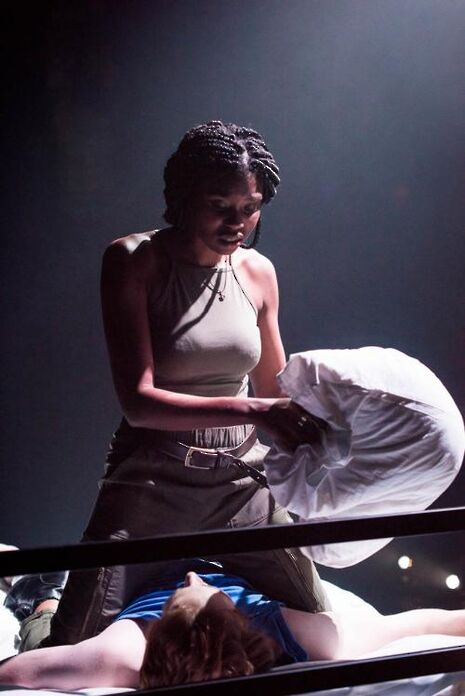Cambridge theatres need gender quotas
Eleanor Costello questions the lack of female roles

When I told my friend that I was writing a piece suggesting that we introduce gender quotas in the world of Cambridge theatre, he reacted with surprise. “Most student productions are majority-female,” he pointed out. “It’s not a problem here.”
To some extent, he’s right. Many Cambridge student productions swap the genders of characters during casting, and anyone who has cast for a show will tell you that there are far more female than male applicants. We’re all young, educated, and this is 2016. There appears to be no reason why parts wouldn’t be available for women.
However, this term the Corpus Playroom has offered 40 parts for men, compared to 33 parts for women, leaving women taking just 45 per cent of roles. At the ADC the figures are more skewed, with 66 parts given to men as opposed to 46 for women, resulting in a gender division of 60:40 in favour of men.
What are the reasons for this division? Well, it can partly be traced to the popularity of Elizabethan and Jacobean plays, which are heavily male-dominated. It is also partly down to the gender bias found in most stand-up comedy shows, where male comedians dominate the field. Sometimes productions are actively barred from changing the gender of casts. The team behind Pembroke Cellars’ production of The History Boys intended to make it all-female, but Alan Bennett’s agent refused them the rights unless the characters remained male.
The issue of gender-swapping is controversial in the theatre world. Last month saw the launch of the 50:50 by 2018 campaign, with several leading theatres, including the Almeida, signing up to a commitment to equality in the gendered parts that are offered. It’s an ambitious campaign, but one that’s been a long time coming. Women are 50 per cent of the population. In 2016, it’s insane that they don’t form 50 per cent of casts.
When he was in town putting on Measure for Measure, I spoke to professional director Tom Littler about this issue: “It’s really exciting. We are miles off that now, because we do so much classic work and work set in the past, which makes it difficult. I definitely think it’s the direction that we should be headed in. It’s easier with Shakespeare than some other playwrights because you have a certain flexibility; we can pick a world in which it makes perfect sense for Escalus, as an authority figure, to become a woman. When you have a more socially realistic work it becomes more tricky in a weird way.
“I definitely think if we’re seeing all-male Shakespeare productions then we ought to see all-female Shakespeare productions, because it’s bonkers. And that whole excuse about it being original practice is such bollocks. Such bollocks – you can quote me on that. If you are going to do original practice then you have to do it properly. You can have a 13-year-old boy playing Juliet, that’s interesting as an experiment. But it’s not original practice to have a thirty-year-old man playing Viola. That’s not what happened. It’s interesting to do Dido, Queen of Cartharge with a cast of boys because that’s how it was done, but it’s not interesting to use drama-school graduate men aged between 20 to 60. It’s bizarre, and why take those parts away? There aren’t enough parts for women as it is.”
One such famous production was Mark Rylance’s Richard III, which saw Rylance himself, a 42-year-old man, playing Olivia, one of the few strong Shakespearean parts for women. I saw Richard III. In an overtly misogynistic play, the whole thing felt very uncomfortable.
This week’s Footlights production features just two women in a cast of nine. The ADC and Corpus Playroom have consistently failed to provide equal numbers of parts for women; in 2015 they offered 239 parts for men and 201 parts for women, a discrepancy of 10 per cent. In a town where the majority of applicants for roles are women, this is disappointing. If CUADC cannot provide equal parts for both genders, then surely introducing gender quotas is the obvious solution to the problem. I contacted CUADC for comment but received no response.
 Comment / Plastic pubs: the problem with Cambridge alehouses 5 January 2026
Comment / Plastic pubs: the problem with Cambridge alehouses 5 January 2026 News / Cambridge businesses concerned infrastructure delays will hurt growth5 January 2026
News / Cambridge businesses concerned infrastructure delays will hurt growth5 January 2026 News / Cambridge academics stand out in King’s 2026 Honours List2 January 2026
News / Cambridge academics stand out in King’s 2026 Honours List2 January 2026 Interviews / You don’t need to peak at Cambridge, says Robin Harding31 December 2025
Interviews / You don’t need to peak at Cambridge, says Robin Harding31 December 2025 News / AstraZeneca sues for £32 million over faulty construction at Cambridge Campus31 December 2025
News / AstraZeneca sues for £32 million over faulty construction at Cambridge Campus31 December 2025









